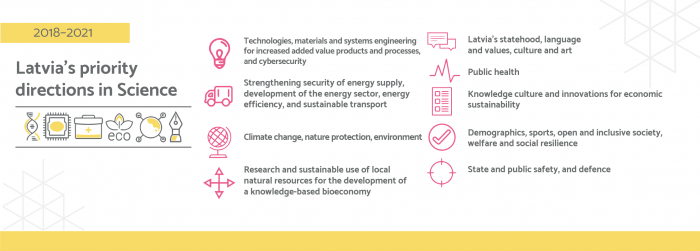Science policy in Latvia is developed in accordance with the Latvian Research and Innovation Strategy for Smart Specialisation (RIS3).
The aim of national science policy is to strengthen Latvia’s research and innovation capacity in priority directions and RIS3 areas, transforming productive structures towards more resource-efficient activities that create higher added value. This goal is approached by increasing investments and lessening institutional barriers. The research and innovation system is being developed which encourages the regeneration of human capital and infrastructure, creating new scientific knowledge and boosting technological progress.
We develop our scientific potential on the basis of the existing scientific traditions, particularly in organic chemistry, medical chemistry, genetic engineering, physics, materials science and information technologies. The highest number of inventions, which are patented both nationwide and abroad, are made in the branch of medical chemistry.
Smart specialization strategy (RIS3)
RIS3 as national research and innovation strategy has been established to articulate and promote the transformation of the Latvia’s economic structure to make it more competitive, strategically prioritising efforts in the most promising areas of research and economic sectors. The strategy also facilitates the creation of policy instruments which release the innovation potential thus promoting knowledge-intensive socioeconomic development.
In Latvia, 5 Smart Specialization areas and one horizontal area – Social Sciences and Humanities have been defined taking into account the potential directions of economic transformation and economic development priorities.
In 2014, Latvia joined the EC RIS3 Platform to develop competence in implementing RIS3 and to facilitate research and innovation cooperation with other EU regions.
Priority directions in science
The national Priority directions in science are revised every four years with the aim of focusing scientific activities towards strategically significant areas for the sustainability and development of Latvia. These Priority directions are also accompanied by financing from the state budget. They are implemented via two research programs: the Fundamental and Applied Research Program and the National Research Program.
The Ministry of Education and Science commissioned a report where sectoral stakeholders (relevant ministries, professional associations, non-governmental organizations and enterprise actors) were surveyed about the most important challenges for society and the future requirements for Latvia’s knowledge base and sectoral human capital development. These recommendations were then integrated into the Priority directions in science for 2018 – 2021.








